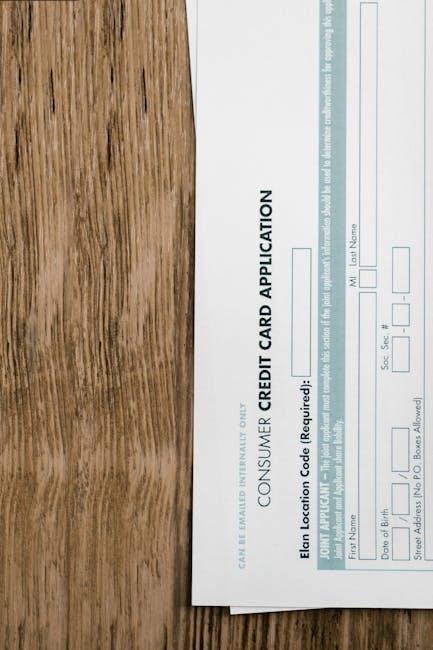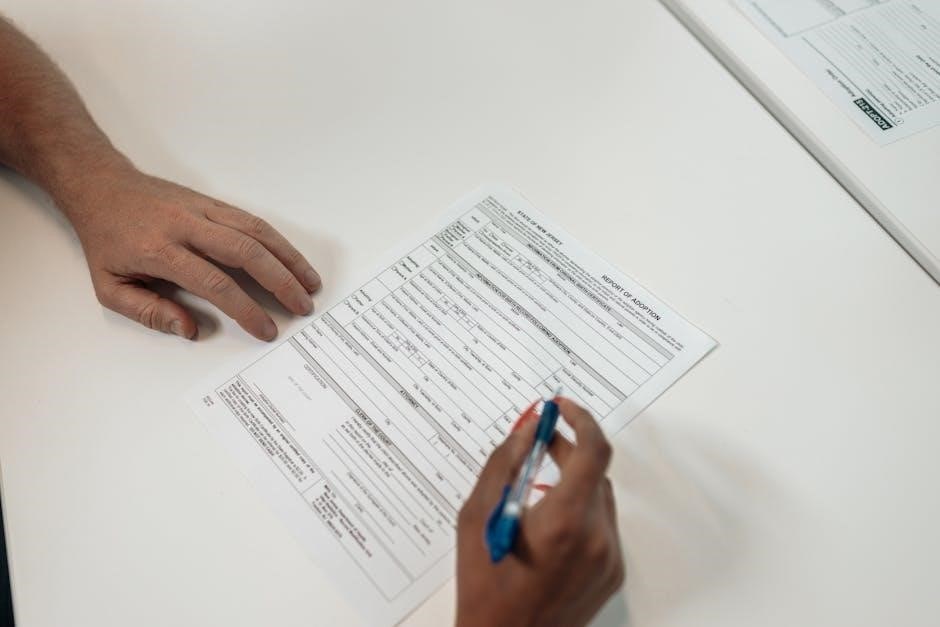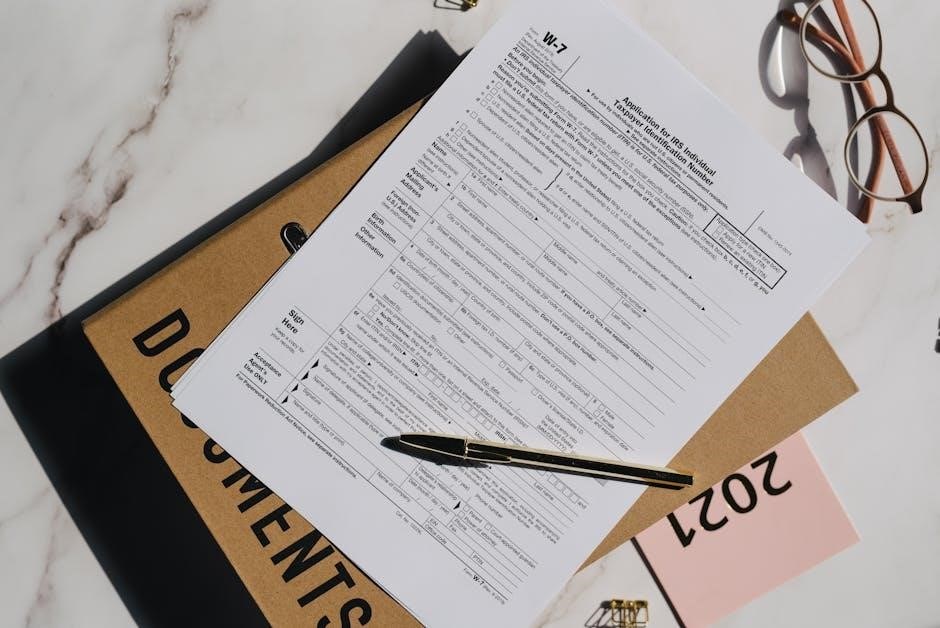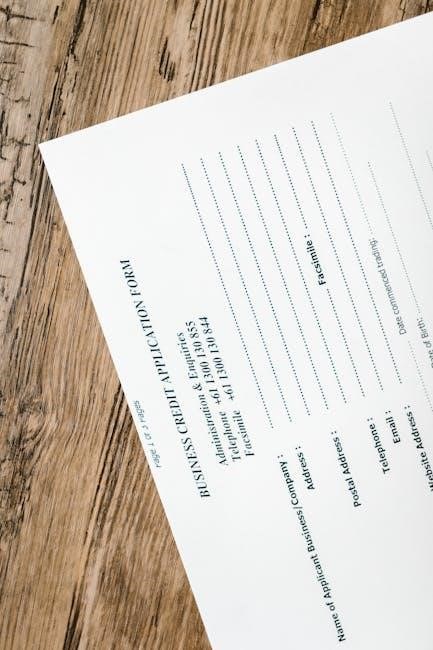The Residence Certificate Application Form in Thailand is essential for foreigners to legally prove their address, required for work, study, or vehicle registration, and is obtained through immigration offices.
Overview of the Residence Certificate in Thailand
A Residence Certificate in Thailand is an official document confirming a foreigner’s legal address within the country. It is typically required for various administrative tasks, such as opening a bank account, registering a vehicle, or applying for a work permit. The certificate is issued by local immigration offices and serves as proof of residency. It is free of charge and usually processed quickly, though requirements may vary depending on the immigration office. The document is essential for foreigners to demonstrate their lawful stay and address in Thailand, ensuring compliance with local regulations and facilitating everyday activities. Its importance lies in its versatility and necessity for integrating into Thai society and bureaucracy.
Importance of the Residence Certificate for Foreigners
The Residence Certificate holds significant importance for foreigners in Thailand as it serves as official proof of their legal address. This document is crucial for accessing essential services and completing administrative tasks. For instance, it is often required when opening a bank account, registering a vehicle, or applying for a driver’s license. Additionally, it simplifies the process of obtaining a work permit and ensures compliance with Thai immigration laws. Without it, foreigners may face difficulties in integrating into daily life and accessing necessary services. Thus, securing a Residence Certificate is a key step for foreigners to maintain legal status and smoothly navigate Thailand’s bureaucratic processes, ensuring their stay remains hassle-free and compliant with local regulations.

Eligibility Criteria for Applying
Foreigners residing in Thailand must hold a valid visa, passport, and proof of address to apply for a Residence Certificate, ensuring compliance with Thai immigration regulations.
Who Needs a Residence Certificate in Thailand
A Residence Certificate is required for foreigners in Thailand needing proof of address, such as for work permits, vehicle ownership, or driver’s licenses, ensuring legal residency compliance.
Types of Applicants: Tourists, Workers, and Residents
Tourists, workers, and residents in Thailand each have specific requirements for obtaining a Residence Certificate. Tourists typically need it for extended stays, workers for employment verification, and residents for legal address proof, ensuring compliance with Thai immigration laws and regulations. This distinction helps tailor the application process to individual needs, streamlining the certification for different groups. Proper documentation and understanding of these categories are crucial for a smooth application experience. Each applicant type must provide relevant documents, such as visas, work permits, or proof of residency, to successfully obtain the certificate, which is essential for various legal and administrative purposes in Thailand. This ensures that all applicants meet the necessary criteria for their specific situation, facilitating a efficient process. Additionally, understanding the differences between these categories helps applicants prepare the correct paperwork, avoiding delays or rejections. By categorizing applicants, the Thai government ensures that the Residence Certificate serves its intended purpose effectively. Thus, knowing one’s applicant type is vital for a successful application. Overall, the classification into tourists, workers, and residents allows the system to accommodate diverse needs while maintaining compliance with immigration policies. This approach supports both the applicants and the authorities in managing residency matters efficiently. Furthermore, it highlights the importance of accurate documentation and adherence to specific requirements for each group, ensuring that the Residence Certificate remains a reliable proof of address in Thailand. By addressing the unique needs of each category, the application process becomes more organized and accessible, benefiting all parties involved. In conclusion, understanding the types of applicants and their respective requirements is essential for navigating the Residence Certificate application process in Thailand successfully. The distinction between tourists, workers, and residents plays a key role in ensuring that each individual’s needs are met appropriately. This structured approach not only simplifies the application process but also reinforces the legal framework governing residency in the country. As a result, applicants can proceed with confidence, knowing that their specific situation is accounted for in the system. The Residence Certificate thereby serves as a crucial document for integrating foreigners into Thai society, facilitating their legal and social inclusion. By recognizing the diverse needs of different applicant types, Thailand’s immigration system demonstrates flexibility and efficiency, making it easier for foreigners to comply with residency requirements. This thoughtful categorization ensures that the application process is both fair and effective, catering to the varied circumstances of individuals residing in Thailand. In summary, the classification of applicants into tourists, workers, and residents is fundamental to the effective administration of the Residence Certificate in Thailand, enabling a personalized and efficient application experience for all. This structured system supports the government’s efforts to manage foreign residency while providing clear guidelines for applicants, promoting order and transparency in immigration processes. The Residence Certificate thus remains an indispensable document for foreigners in Thailand, serving as official proof of their legal status and address. By understanding and adhering to the specific requirements of their applicant category, individuals can ensure a smooth and successful application process. This, in turn, contributes to the overall integrity and functionality of Thailand’s immigration framework. The differentiation between applicants also allows for targeted support and resources, addressing the unique challenges faced by each group. This tailored approach enhances the overall experience of obtaining a Residence Certificate, making it more accessible and user-friendly. Consequently, the categorization of applicants plays a pivotal role in maintaining the efficiency and effectiveness of Thailand’s residency certification system. It ensures that all foreigners, regardless of their purpose in the country, can obtain the necessary documentation to live, work, or visit Thailand legally. This systematic approach not only benefits the applicants but also strengthens the country’s immigration policies, promoting a balanced and organized management of foreign residency. In conclusion, the classification of applicants into tourists, workers, and residents is a cornerstone of the Residence Certificate application process in Thailand, providing a clear and structured path for individuals to obtain the necessary documentation. This system reflects the government’s commitment to facilitating legal residency while maintaining the integrity of its immigration laws. By recognizing and addressing the distinct needs of each applicant type, Thailand ensures that the Residence Certificate remains a vital and accessible document for foreigners, supporting their integration into Thai society and compliance with legal requirements. The Residence Certificate thus stands as a testament to Thailand’s organized approach to immigration, offering a straightforward solution for foreigners to establish their legal residency and pursue their goals within the country. This structured system not only aids individuals in navigating the application process but also upholds the principles of fairness and transparency in immigration practices. As a result, the Residence Certificate continues to be an essential document for foreigners in Thailand, enabling them to live, work, and thrive in the country with legal certainty. The distinction between applicant types ensures that the application process is tailored to individual circumstances, making it more efficient and effective for all involved. This thoughtful system underscores Thailand’s dedication to creating a welcoming yet regulated environment for foreign nationals, balancing the needs of the state with the needs of its residents. In summary, the categorization of applicants into tourists, workers, and residents is a critical component of the Residence Certificate application process in Thailand, ensuring that each individual’s needs are met with precision and clarity. This approach not only streamlines the application process but also reinforces the legal and social framework necessary for foreigners to integrate successfully into Thai society. By providing a structured and accessible system, Thailand facilitates the legal residency of foreigners, contributing to the country’s diverse and inclusive community. The Residence Certificate thereby serves as a bridge between foreign nationals and the Thai government, fostering mutual understanding and cooperation. This essential document ensures that foreigners can live and work in Thailand with confidence, knowing that their legal status is recognized and secured. The classification of applicants into distinct categories further enhances the system’s efficiency, allowing for targeted support and resources to address the unique challenges faced by each group. This tailored approach ensures that the application process is both fair and effective, providing a positive experience for all applicants. In conclusion, the differentiation between tourists, workers, and residents in the Residence Certificate application process is vital for maintaining a well-organized and equitable immigration system in Thailand. It allows the government to manage foreign residency effectively while providing foreigners with the necessary tools to comply with legal requirements. This structured system supports the country’s goal of creating a harmonious and inclusive environment for all residents, foreign and domestic alike. By understanding and adhering to the specific requirements of their applicant category, individuals can ensure a seamless and successful application process, securing their legal status in Thailand. This, in turn, contributes to the overall stability and prosperity of the nation, as a well-regulated immigration system fosters trust and cooperation between the government and its foreign residents. The Residence Certificate thus remains an indispensable document for foreigners in Thailand, serving as a cornerstone of their legal residency and integration into society. The classification of applicants into tourists, workers, and residents ensures that the application process is both efficient and personalized, addressing the diverse needs of foreign nationals. This structured approach not only benefits the applicants but also strengthens Thailand’s immigration framework, promoting a balanced and organized management of foreign residency. In summary, the categorization of applicants is essential for the effective administration of the Residence Certificate in Thailand, providing a clear and structured path for foreigners to obtain the necessary documentation. This system reflects the government’s commitment to facilitating legal residency while maintaining the integrity of its immigration laws. By recognizing and addressing the distinct needs of each applicant type, Thailand ensures that the Residence Certificate remains a vital and accessible document for foreigners, supporting their integration into Thai society and compliance with legal requirements. The Residence Certificate thus stands as a testament to Thailand’s organized approach to immigration, offering a straightforward solution for foreigners to establish their legal residency and pursue their goals within the country. This structured system not only aids individuals in navigating the application process but also upholds the principles of fairness and transparency in immigration practices. As a result, the Residence Certificate continues to be an essential document for foreigners in Thailand, enabling them to live, work, and thrive in the country with legal certainty. The distinction between applicant types ensures that the application process is tailored to individual circumstances, making it more efficient and effective for all involved. This thoughtful system underscores Thailand’s dedication to creating a welcoming yet regulated environment for foreign nationals, balancing the needs of the state with the needs of its residents. In summary, the categorization of applicants into tourists, workers, and residents is a critical component of the Residence Certificate application process in Thailand, ensuring that each individual’s needs are met with precision and clarity. This approach not only streamlines the application process but also reinforces the legal and social framework necessary for foreigners to integrate successfully into Thai society. By providing a structured and accessible system, Thailand facilitates the legal residency of foreigners, contributing to the country’s diverse and inclusive community. The Residence Certificate thereby serves as a bridge between foreign nationals and the Thai government, fostering mutual understanding and cooperation. This essential document ensures that foreigners can live and work in Thailand with confidence, knowing that their legal status is recognized and secured. The classification of applicants into distinct categories further enhances the system’s efficiency, allowing for targeted support and resources to address the unique challenges faced by each group. This tailored approach ensures that the application process is both fair and effective, providing a positive experience for all applicants. In conclusion, the differentiation between tourists, workers, and residents in the Residence Certificate application process is vital for maintaining a well-organized and equitable immigration system in Thailand. It allows the government to manage foreign residency effectively while providing foreigners with the necessary tools to comply with legal requirements. This structured system supports the country’s goal of creating a harmonious and inclusive environment for all residents, foreign and domestic alike. By understanding and adhering to the specific requirements of their applicant category, individuals can ensure a seamless and successful application process, securing their legal status in Thailand. This, in turn, contributes to the overall stability and prosperity of the nation, as a well-regulated immigration system fosters trust and cooperation between the government and its foreign residents. The Residence Certificate thus remains an indispensable document for foreigners in Thailand, serving as a cornerstone of their legal residency and integration into society. The classification of applicants into tourists, workers, and residents ensures that the application process is both efficient and personalized, addressing the diverse needs of

Required Documents for the Application
To apply for a Residence Certificate in Thailand, you need a valid passport, visa, proof of address, TM30 form, and recent passport-sized photos. Additional documents may be required based on your status;

Mandatory Documents: Passport, Visa, and Proof of Address
A valid passport with at least six months’ validity is the primary document required for the Residence Certificate application. Your visa, whether it’s a tourist, work, or retirement visa, must also be up-to-date. Proof of address, such as a rental agreement or a house registration document (Tabien Baan), is essential to confirm your residence in Thailand. These documents establish your identity, legal stay, and residential status in the country. Ensuring they are valid and accurately reflect your current situation is crucial for a smooth application process. Submitting these mandatory documents correctly is the first step toward obtaining your Residence Certificate.
Additional Documents: TM30 Form and Work Permit (if applicable)
The TM30 form is required for foreigners staying in Thailand and must be submitted upon arrival and each time you re-enter the country. This form notifies immigration authorities of your residence and travel details. If you are employed, a valid work permit is also necessary to support your Residence Certificate application. The TM30 form and work permit provide additional verification of your legal status and residence in Thailand. These documents complement the mandatory passport, visa, and proof of address, ensuring compliance with immigration regulations. It is essential to check with the immigration office for any specific requirements, as procedures may vary depending on your circumstances.
Photo Requirements: Passport-Sized Photos
For the Residence Certificate application, you must submit two passport-sized photos. These photos should be recent, in color, and taken against a white background. The dimensions must be 4cm x 6cm. The photos should clearly show your face without any obstructions, such as hats or sunglasses. It is important to ensure the photos meet the specifications, as immigration offices may reject applications with non-compliant photos. Additionally, the photos should be printed on high-quality paper to maintain clarity. Some immigration offices may have specific requirements, so it is advisable to verify the guidelines beforehand to avoid delays. Properly formatted photos are essential for a smooth application process;

Application Process
The application process involves obtaining and filling out the form correctly, submitting it at the immigration office, and tracking its status for approval, ensuring all steps are followed accurately.
Obtaining the Application Form
To obtain the Residence Certificate Application Form in Thailand, visit the local immigration office near your registered address. The form is usually available for free at the office. Ensure you collect the correct version specific to your needs. Some offices may provide digital copies online, but it’s advisable to confirm availability. Bring a valid passport and visa for verification purposes. The form is straightforward and designed to gather essential personal and address details. Before filling it out, review the instructions carefully. If unsure, seek assistance from immigration staff to avoid errors. This step is crucial for a smooth application process.
Filling Out the Application Form Correctly
Filling out the Residence Certificate Application Form requires careful attention to detail. Read the instructions thoroughly before starting. Use block letters and ensure all information is accurate and complete. Provide your full name, passport details, visa type, and current address in Thailand. Attach a copy of your TM30 form, if applicable, and include passport-sized photos as specified. Double-check for any errors or omissions, as mistakes can delay processing. Ensure your signature is clear and dates are correctly formatted. If applying for specific purposes, such as vehicle ownership or work, include the relevant supporting documents. Accuracy is key to avoiding rejections or additional requests from immigration officials.
Submitting the Application at the Immigration Office
Once your application form is complete, visit the designated immigration office corresponding to your registered address in Thailand. Arrive early to avoid long queues and bring all required documents, including your passport, visa, TM30 form, and photos. Upon arrival, take a queue number and wait for your turn. Submit your application to the officer, who will review your documents. Ensure all information is correct and no documents are expired or missing. The process is typically straightforward, but delays may occur if additional verification is needed. The Residence Certificate is usually issued free of charge and may be ready within a few days, depending on the office’s workload. Always confirm the submission process and required documents with the immigration staff beforehand to avoid complications.
Tracking the Application Status
After submitting your Residence Certificate application, you can track its status through the Thai Immigration Office’s official website or by contacting them directly. Some immigration offices provide an online portal where you can enter your application reference number to check the progress. Alternatively, you can visit the immigration office in person or call their hotline to inquire about your application’s status. Ensure you have your application receipt or reference number ready for verification. Processing times may vary, but most applications are processed within a few working days. Regular follow-ups can help ensure your application is reviewed promptly, avoiding unnecessary delays. Keep your documents handy for any additional requests from the immigration authorities.

Where to Apply
Residence Certificate applications are submitted at local immigration offices across Thailand. Major cities like Bangkok, Chiang Mai, and Phuket have dedicated offices for this process, ensuring accessibility for all applicants.
Local Immigration Offices in Major Cities
Local immigration offices in major cities like Bangkok, Chiang Mai, and Phuket provide convenient locations for submitting residence certificate applications. These offices are well-equipped to handle the process efficiently, ensuring accessibility for both locals and expatriates. The Chiang Mai Immigration Office, located near the airport, is particularly popular for its streamlined services. Similarly, Bangkok’s main immigration office offers comprehensive assistance, while Phuket’s office caters to the large expatriate and tourist population. Each location is strategically placed to serve residents across Thailand, making it easier to apply for and obtain the necessary documentation. Staff at these offices are trained to guide applicants through the process smoothly;
Chiang Mai Immigration Office Near the Airport
The Chiang Mai Immigration Office near the airport is a convenient location for applicants residing in or near Chiang Mai. This office is known for its efficient processing of residence certificate applications and other immigration-related services. It is particularly popular among expatriates and travelers due to its proximity to the airport, making it easily accessible for those who need to handle immigration matters quickly. The office provides clear guidance on required documents, such as the TM30 form, passport, and visa, ensuring a smooth application process. Applicants are advised to arrive early and be prepared with all necessary paperwork to avoid delays. This office is a key resource for anyone in northern Thailand seeking a residence certificate.

Processing Time and Fees
The Residence Certificate application in Thailand typically processes within a few days, often same-day. The certificate itself is free, though minor fees may apply for additional services.
Average Processing Time for the Residence Certificate
The average processing time for a Residence Certificate in Thailand is typically quick, often completed on the same day or within a few working days. Factors such as the workload of the immigration office and the completeness of the application can influence the timeline. In major cities like Chiang Mai, where the immigration office is well-organized, applicants often receive their certificates promptly. It’s advisable to submit the application in the morning to ensure same-day processing. While the certificate itself is free, minor fees may apply for additional services, such as expedited processing or document authentication. Planning ahead and submitting early ensures a smooth experience.
Fees Associated with the Application Process
The Residence Certificate in Thailand is typically free of charge, as it is a standard document provided by immigration offices. However, there may be minor fees associated with related services, such as the TM30 form, which costs 500 THB. Additionally, if document legalization or translation services are required, applicants may incur extra charges, typically ranging from 500 to 1,000 THB, depending on the service provider. It’s important to note that these fees are not mandatory for the Residence Certificate itself but may apply for supplementary processes. Always verify with the local immigration office for the most accurate and up-to-date fee information to avoid unexpected costs.

Purpose and Benefits
The Residence Certificate in Thailand serves as official proof of address, simplifying procedures for opening bank accounts, registering businesses, and obtaining driving licenses, enhancing legal residency advantages.
Why a Residence Certificate is Necessary
A Residence Certificate is a legal document proving your address in Thailand, essential for various administrative tasks such as obtaining a work permit or opening a bank account.
It is required for vehicle registration, studying, and accessing certain government services, ensuring compliance with Thai immigration laws and regulations for foreigners.
The certificate is free and mandatory for anyone residing in Thailand, as it serves as official proof of residency, simplifying legal and administrative processes for both short-term and long-term stays.
Benefits of Having a Residence Certificate
Having a Residence Certificate in Thailand provides numerous benefits, primarily simplifying legal and administrative processes for foreigners. It serves as official proof of residency, making it easier to access essential services like opening a bank account or purchasing property.
The certificate is crucial for vehicle registration and obtaining a driving license, which are essential for daily life in Thailand. Additionally, it facilitates compliance with immigration laws, reducing the risk of legal issues during your stay.
For long-term residents, the certificate supports applications for permanent residency or Thai citizenship. It also aids in accessing government services, healthcare, and education, ensuring a smoother integration into Thai society.

Common Mistakes to Avoid
Common mistakes include submitting incorrect or incomplete application forms, missing or expired documents, and failing to file the TM30 form upon re-entry to Thailand, which can delay processing.
Incorrect or Incomplete Application Form
One of the most common errors in the residence certificate application process is submitting an incorrect or incomplete form. This can delay processing significantly. Applicants must ensure all personal details, such as name, address, and passport information, are accurate and match the supporting documents. Failure to sign the form or omitting required sections can lead to rejection. It is crucial to double-check every field before submission. Additionally, ensuring the form is filled in the correct language and format as specified by Thai immigration authorities is essential. Incomplete applications may result in additional paperwork or repeat visits to the immigration office, causing inconvenience and wasted time. Always review the form carefully or seek assistance if unsure.
Missing or Expired Documents
Missing or expired documents are a common issue that can hinder the residence certificate application process. Applicants must ensure all required documents, such as a valid passport, visa, and proof of address, are up-to-date and included. Expired documents, such as an outdated passport or visa, can lead to rejection. Additionally, failure to provide the TM30 form or work permit (if applicable) can cause delays. It is crucial to verify the validity of all documents before submission. If any document is missing or expired, the application will not be processed, resulting in additional time and effort to correct. Always double-check the expiration dates and completeness of your documents to avoid unnecessary complications.

Special Cases and Exceptions
Special cases include students, vehicle owners, and diplomatic personnel, requiring additional documentation like enrollment letters or ownership proof. Exceptions may apply for diplomatic or official visa holders.
Applying for a Residence Certificate as a Student
Students in Thailand may need a Residence Certificate for school enrollment, visa extensions, or other official purposes. The process involves submitting a valid passport, visa, and proof of address. Additionally, a TM30 form and enrollment letter from the educational institution may be required. Students should visit the immigration office corresponding to their registered address. The Residence Certificate is often mandatory for accessing certain services or benefits. It’s important to ensure all documents are up-to-date and correctly submitted to avoid delays. Some schools may also require this certificate for enrollment or student visa renewal. The process is relatively straightforward if all requirements are met. Proper documentation ensures compliance with Thai immigration regulations.
Applying for a Residence Certificate for Vehicle Ownership
A Residence Certificate is often required for foreigners in Thailand to purchase or register a vehicle. This document confirms the applicant’s legal address and residency status. To apply, individuals must provide a valid passport, visa, and proof of address, along with a completed TM30 form. Additional documentation, such as a work permit or rental agreement, may be requested. The certificate is essential for obtaining a Thai driver’s license or buying a vehicle from a licensed dealer. The process typically involves submitting the application at the local immigration office. Proper documentation ensures compliance with Thai regulations and facilitates smooth vehicle ownership transactions. This certificate is a crucial step for foreigners seeking to own or operate a vehicle legally in Thailand.
The Residence Certificate in Thailand is crucial for legal residency, proving address for work, study, or vehicle ownership, requiring essential documents and offering a free, efficient process.
Final Tips for a Smooth Application Process
To ensure a seamless application process for your Thai Residence Certificate, gather all required documents in advance and double-check their validity. Complete the application form accurately, ensuring all details match your supporting documents. Arrive early at the immigration office to avoid delays, and prepare photocopies of your passport, visa, and proof of address. If applying for specific purposes like vehicle ownership or employment, verify additional requirements beforehand. Be aware that some offices may request extra documentation, so it’s wise to inquire about local procedures. Lastly, keep track of your application status through official channels and follow up promptly if issues arise.
Next Steps After Receiving the Residence Certificate
Once you receive your Residence Certificate, ensure it is kept in a safe place for future use. This document is essential for legal purposes, such as registering a vehicle, opening a bank account, or applying for a work permit. If you plan to use it for specific purposes like purchasing a vehicle or obtaining a driver’s license, verify the requirements with the relevant authorities. Additionally, consider notifying your embassy or consulate of your updated legal status in Thailand. Always carry a photocopy of the certificate and keep the original secure. Finally, monitor the certificate’s expiration date and renew it as needed to maintain your legal residency status.
